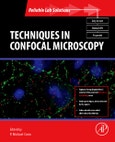As part of the Reliable Lab Solutions series, Techniques in Confocal Microscopy brings together chapters from volumes 302, 307 and 356 of Methods in Enzymology. It documents many diverse uses for confocal microscopy in disciplines that broadly span biology.
Please Note: This is an On Demand product, delivery may take up to 11 working days after payment has been received.
Table of Contents
Part I. Practical Considerations and Equipment1. Theoretical Basis of Confocal Microscopy
Robert H. Webb
2. Practical Considerations in Acquiring Biological Signals from Confocal Microscope
Hao He, Rose Chik Ying Ong, Kam Tai Chan, Ho Pui Ho, Siu Kai Kong
3. Equipment for Mass Storage and Processing of Data
Guy Cox
4. Antifading Agents for Confocal Fluorescence Microscopy
Miguel Berrios, Kimberly A. Conlon, and David E. Colflesh
5. Mounting Techniques for Confocal Microscopy
Manabu Kagayama and Yasuyuki Sasano
6. Preparation of Whole Mounts and Thick Sections for Confocal Microscopy
Hisashi Hashimoto, Hiroshi Ishikawa, and Moriaki Kusakabe
7. Use of Confocal Microscopy to Investigate Cell Structure and Function
Ghassan Bkaily, Danielle Jacques
8. Combining Laser Scanning Confocal Microscopy and Electron Microscopy
Xuejun Sun
Part II. Functional Approaches
9. Volume Measurements in Confocal Microscopy
Carlos B. Mantilla, Y.S. Prakash and Gary C. Sieck
10. Quantitation of Phagocytosis by Confocal Microscopy
George F. Babcock and Chad T Robinson MS
11. Receptor-Ligand Internalization
Guido Orlandini, Nicoletta Ronda, Rita Gatti, Gian Carlo Gazzola, and Alberico Borghetti
12. Quantitative Imaging of Metabolism by Two-Photon Excitation Microscopy
David W. Piston and Susan M. Knobel
13. Trafficking of the Androgen Receptor
Virginie Georget, Béatrice Terouanne, Jean-Claude Nicolas, and Charles Sultan
14. Localization of Proteases and Peptide Receptors by Confocal Microscopy
Kanti D. Bhoola, Celia J. Snyman and Carlos D. Figueroa
15. Multiphoton Excitation Microscopy, Confocal Microscopy, and Spectroscopy of Living Cells and Tissues: Functional Metabolic Imaging of Human Skin in Vivo
Barry R. Masters, Peter T. C. So, Ki Hean Kim, Christof Buehler, and Enrico Gratton
16. Video-Rate, Scannng Slit Confocal Microscopy of Living Human Cornea in Vivo: Three-Dimensional Confocal Microscopy of the Eye
Barry R. Masters and Matthias Böhnke
17. In Vivo Imaging of Mammalian Central Nervous System Neurons with the In Vivo Confocal Neuroimaging (ICON) Method
Sylvia Prilloff, Petra Henrich-Noack, Ralf Engelmann, Bernhard A. Sabel
18. Identification of Viral Infection by Confocal Microscopy
David N. Howell and Sara E. Miller
19. Membrane Trafficking
Sabine Kupzig, San San Lee, and George Banting
Part III. Green Fluorescent Protein
20. Monitoring of Protein Secretion with Green Fluorescent Protein
Christoph Kaether and Hans-Hermann Gerdes
21. Comparison of Enhanced Green Fluorescent Protein and Its Destabilized Form as Transcription Reporters
Xiaoning Zhao, Tommy Duong, Chiao-Chian Huang, Steven R. Kain, and Xianqiang Li
22. Measuring Protein Degradation with Green Fluorescent Protein
Stephen R. Cronin and Randolph Y. Hampton
23. Studying Nuclear Receptors with Green Fluorescent Protein Fusions
Gordon L. Hager
24. Signaling, Desensitization, and Trafficking of G Protein-Coupled Receptors Revealed by Green Fluorescent Protein Conjugates
Larry S. Barak, Jie Zhang, Stephen S. G. Ferguson, Stephane A. Laporte, and Marc G. Caron
25. Fluorescent Proteins in Single- and Multicolor Flow Cytometry
Lonnie Lybarger and Robert Chervenak
26. Jellyfish Green Fluorescent Protein: A Tool for Studying Ion Channels and Second-Messenger Signaling in Neurons
L. A. C. Blair, K. K.Bence, and J. Marshall
27. Expression of Green Fluorescent Protein and Inositol 1,4,5-Triphosphate Receptor in Xenopus laevis Oocytes
Atshushi Miyawaki, Julie M. Matheson, Lee G. Sayers, Akira Muto, Takayuki Michikawa, Teiichi Furuichi, and Katsuhiko Mikoshiba
28. Confocal Imaging of Ca2+, pH, Electrical Potential, and Membrane Permeability in Single Living Cells
John J. Lemasters, Donna R. Trollinger, Ting Qian, Wayne E. Cascio, and Hisayuki Ohata
Part IV. Laser Capture Microdissection
29. Laser Capture Microdissection and Its Applications in Genomics and Proteomics
James L. Wittliff
30. Going in Vivo with Laser Microdissection
Anette Mayer, Monika Stich, Dieter Brocksch, Karin Schütze, and Georgia Lahr
31. Flourescence in Situ Hybridization of LCM-Isolated Nuclei from Paraffin Sections
Douglas J. Demetrick, Sabita K. Murthy, and Lisa M. DiFrancesco







